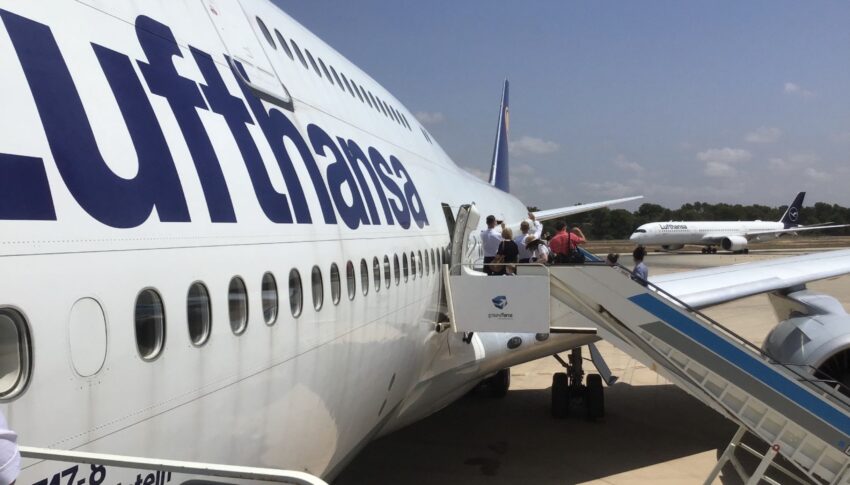The arrival of not one, but two Lufthansa widebody jets packed with sun-seeking tourists at Palma de Mallorca airport on 31 July was symbolic of the COVID-hit summer of 2021, characterised by shifting travel restrictions and the difficulties faced by airlines in catering to the peaks and troughs of demand.
Data shows Germans are the second largest group of tourist arrivals to Mallorca, after the Spanish. In 2020, Mallorca saw 665,000 visits from Germany. The next biggest group of overseas visitors, from the United Kingdom, accounted for just 152,000 arrivals.
In 2021, the German government removed Mallorca from its red list of destinations over Easter, allowing a wave of sun-seeking Germans to travel to the island even when restrictions were much tighter at home.
With booking numbers rising for the summer holidays too, Lufthansa took what it described as “extraordinary measures”, deciding to operate a Boeing 747-8 from Frankfurt on four Saturdays and an Airbus A350 on July 31 from Munich.
Long-haul jets are often used on short flights for training as part of entry into service. It helps the crew to get used to the new aircraft on repeated shorter flights, without the risk of being too far away from their airline’s main maintenance base, should any teething problems or technical issues arise. However, there were some new considerations for the Lufthansa crews this summer.
“Mallorca is a bit different because Lufthansa has never flown there with an A350 before. Others maybe, but not Lufthansa,” Lufthansa Captain Martin Hoell tells us.
Factors such as staffing, runway length, ground times, facilities all play a part.
“Can the A350 fly there, is the runway long enough, are all the night requirements there if you’re flying there at night?” Hoell says.
For example, the Lufthansa 747 or A350 need to spend longer on the ground at the airport before they fly back, with turnaround times taking around 1.5 hours instead of 45 minutes for the A320 that usually operates the route.
Hoell notes that ground staff is crucial. Typically, the airline requires on-site technical staff or loadmasters who are qualified to look after that type of aircraft. However, Mallorca is more used to handling narrowbody aircraft, with the arrivals board typically being made up of Airbus A320 family jets or Boeing 737s.
“For this particular flight, we brought a technician from Munich with us, a loadmaster, who could look after the loading in Mallorca,” Lufthansa’s Hoell explains.
Another difference for the crew was the shorter flight distance and time. Preparations and calculations for the departure and arrival airports require the same amount of work as for a long-haul flight, in terms of checking the weather, NOTAMS and charts. However, while much of that is available as part of electronic flight bags these days, cutting down the amount of paper pilots need to take into the flight deck with them, the reading can still take time.
The difference from long-haul flights is, perhaps expectedly, the shorter cruise part of the flight, Hoell says. For example, for long-haul flights, crews likely have several possible alternate airports along the route for which they need to check the weather, NOTAMS, performance calculations and operational availability. But that list is reduced for short routes.
“For a long haul flight, there’s a lot more to read in terms of the airports en route, the weather en route. For a shorter flight, that can be kept shorter,” he says.
A flight usually involves a 30 minute climb and 30 minute descent, with the rest of the time spent in the cruise phase of the flight. The flight to Mallorca took just 1 hour 50 minutes, leaving under an hour in the cruise.
“When I fly to Los Angeles, it’s 10 hours for the cruise phase,” Hoell says.
What was also different about this flight was the number of passengers who wanted to see in the flight deck, Hoell notes, saying there was a big queue on the ground to visit the seats at the pointy end.
Some passengers even booked to fly from Munich on the A350 and then return on the 747 flight to Frankfurt a week later to get the full long-haul experience on short-haul.
“It’s a shame we couldn’t fly the A350 there more often,” says Lufthansa spokeswoman Bettina Rittberger. “But the A350 was needed in Frankfurt.”
A key challenge for any operator is ensuring passengers have the right COVID documentation to get to your destination. Checking the documents is no mean feat either, and is resulting in queues at airports.
Lufthansa launched its digital document check back in February to help with the process. Passengers can upload test certificates, entry forms, and vaccination passports, in encrypted form, up to 12 hours before departure. They are then checked by the Health Entry Support Centre and if valid, a digital boarding pass for the flight is issued.
Still, the summer jumbo experiences didn’t quite go all to plan. A press trip planned for the A350 flight from Munich to Mallorca had to be cancelled at short notice, when Germany once again declared the whole of Spain, including the Balearics, a COVID-risk area.
Airlines need to be on their guard as they battle through what is hopefully the end phase of the pandemic. A handful of special flights certainly is not enough to save summer for Lufthansa and its rivals, nor for the destinations which so desperately rely on the business of tourists seeking their summer break. But it shows the way airlines need to keep thinking creatively and coming up with ideas and innovations to excite passengers.
Author: Victoria Bryan
Published: 26th October 2021
Lead Photo: Copyright Lufthansa




